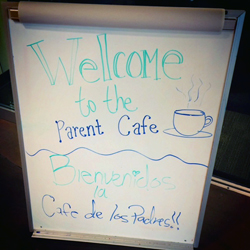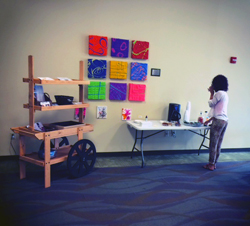The Harvard Family Research Project separated from the Harvard Graduate School of Education to become the Global Family Research Project as of January 1, 2017. It is no longer affiliated with Harvard University.
October 2015
Welcome to the Parent Café!
 Project Eagle, an Early Head Start program in Kansas City, Kansas hosts a once-a-month Parent Café. |
|
WHO’S AT THE CAFÉ?
Age Range: Youth and adults 14‒43 years of age Race/Ethnic Representation: 20% African American; 68% Hispanic; 8% White, Non-Hispanic; 4% Other Employment Status: 70% work, go to school, or are in a job training program; 30% are unemployed or between jobs |
 Staff provide parents the opportunity to organize and facilitate Cafés. Looking forward, staff hope parent will take complete ownership over the Café. |
| Research Connection Research by prominent sociologist Mario Luis Small suggests that parent networks and organizational ties are associated with positive outcomes such as economic security and family well-being. The Parent Café is a way organizations can connect families to one another and to community resources. It is a low-cost activity that can reap huge benefits for isolated families.
|
It’s a Wednesday morning at Project Eagle, an Early Head Start program in Kansas City, Kansas. A group of parents are gathered near a table set out with coffee and pastries, as soft music plays in the background. Next to the table, another set of parents stand around a cart exploring resources on school readiness and family engagement. Other parents grab pens and markers, and on a sheet of butcher paper, write questions that they would like to have answered by program staff regarding specific topics related to their preschooler’s learning and development. Their questions include: “What are good ideas to help your child eat more vegetables and fruits?” and “What are some resources to help me encourage learning at home?”
Introducing the Parent Café
The Parent Café embraces the idea that parents benefit when they have the opportunity to gather with one another and discuss important issues of child development and family engagement. Project Eagle, an early childhood program of the Department of Pediatrics at the University of Kansas Medical Center, has begun using the Parent Café as a way to help parents create more meaningful interactions with one another. Project Eagle staff noticed that many families were having informal sidewalk conversations with one another before and after pickup. Staff wanted to move the conversations inside and make them even more meaningful. The Parent Café is now a once-a-month morning get-together of parents that takes place from 7:30‒9:30 a.m.—during peak child drop-off—in the center’s multipurpose room by the building’s main door. As parents drop their children off in the morning, master teachers and family support coordinators greet parents and welcome them into the gathering room. Once inside, parents are offered fresh coffee and snacks—just a few of Project Eagle’s strategies to make the space inviting and welcoming.
Although the café began simply as a gathering space for parents, it has grown over time to include casual conversations on topics of interest to parents that range from child nutrition, to weather and car seat safety, to ESL classes. Other conversation topics at the Parent Café include GED classes, at-home learning activities, and information about Talk, Read, Play—a campaign to provide parents with tips on early learning, cooking and a recipe exchange, preparing for natural disasters, hand-washing techniques, and health insurance. In the program’s early stages, Project Eagle staff generated questions for the Parent Café, but over time, parents have taken the lead and generated their own questions and chosen their own conversation topics.
In order to make best use of the opportunity to discuss these important issues with parents, Project Eagle partners with community members and organizations such as Girl Scouts, Healthy Communities Wyandotte, Children’s Mercy Hospital, and Reach Out and Read. These organizations offer professional knowledge and resources to parents.
Outcomes and Future Goals
Today, parents who take part report new and strengthened relationships with other parents. Participation at the Parent Café has grown, and the café currently serves a wide age range of parents from diverse backgrounds. Parents also say that they have found a comfortable space to share their thoughts and feedback on past and upcoming events. In addition, center staff members believe the café has sparked and nurtured meaningful relationships between parents and center staff. These new relationships provide parents with an increased sense of support from the center. Looking ahead, Project Eagle staff will gradually turn over the organization and management of the café to parents.
Helpful Tips
For those interested in creating parent cafés, staff at Project Eagle share three pieces of advice:
(1) start small and prepare for attendance to be low at the beginning,
(2) continually seek parent input and feedback, and
(3) give parents the opportunity to own and manage the cafés.
Small, M. L. (2009). Unanticipated gains: Origins of network inequality in everyday life. New York, NY: Oxford University Press.
SNAPSHOTS CONTRIBUTOR:
As a graduate research assistant at Harvard Family Research Project, Laura Alves works on projects for the Family Involvement Network of Educators (FINE) and the Parent University Network. Laura holds an Ed.M. in Education Policy and Management from Harvard Graduate School of Education.
SEND US YOUR SNAPSHOTS! If you’re doing something that you think others should know about, we invite you to send us a description with a photo or short video to fine@gse.harvard.edu with the subject line: SNAPSHOTS.
BE INSPIRED BY OTHER SNAPSHOTS!

